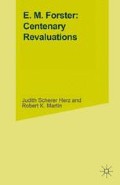Abstract
Were Henry James to have a celestial tea party, inviting Henry Fielding, Laurence Sterne, Jane Austen, Emily Brontë, George Eliot, William Makepeace Thackeray, Joseph Conrad and E. M. Forster, no doubt, as James himself might say, contradiction would grow ‘young again over tea cups and cigars’.1 One can imagine the restless spoons if the conversation turned to the role of the narrator in the novel. James, of course, would advocate viewing the actions of the story through a central intelligence, whose perspective would rule out the possibility of even an occasional authorial intrusion. Jane Austen and George Eliot would talk sense, Austen sympathizing with Eliot’s need to establish, through authorial comment, norms against which her characters could be measured, and confessing that she too occasionally resorts to this tactic, though not nearly as often nor as extensively as Eliot. Miss Brontë might wait half the afternoon for Conrad to arrive, to ask whether her multiple and unreliable narrators in Wuthering Heights inspired techniques in his own fiction. Conrad, however, would not show up, preferring to hear about such parties second hand. Sterne would wait for Thackeray to reconsider his words against Tristram Shandy, and to realize how much the intrusive narrator of Vanity Fair has in common with Tristram.2
Access this chapter
Tax calculation will be finalised at checkout
Purchases are for personal use only
Preview
Unable to display preview. Download preview PDF.
Notes
Henry James, What Maisie Knew, in The Novels and Tales of Henry fames, New York Edition, XI ( New York: Charles Scribner’s Sons, 1908 ), pp. 6–7.
E. M. Forster, Aspects of the Novel, ed. Oliver Stallybrass, Abinger edn. ( London: Edward Arnold, 1974 ), p. 57.
E. M. Forster, ‘London is a Muddle’, Two Cheers for Democracy, ed. Oliver Stallybrass, Abinger edn. (London: Edward Arnold, 1972), pp. 350, 352.
E. M. Forster, Abinger Harvest ( London: Edward Arnold. 1961 ), p. 13.
Editor information
Editors and Affiliations
Copyright information
© 1982 Judith Scherer Herz and Robert K. Martin
About this chapter
Cite this chapter
Rivenberg, P.R. (1982). The Role of the Essayist-Commentator in Howards End. In: Herz, J.S., Martin, R.K. (eds) E. M. Forster: Centenary Revaluations. Palgrave Macmillan, London. https://doi.org/10.1007/978-1-349-05625-5_10
Download citation
DOI: https://doi.org/10.1007/978-1-349-05625-5_10
Publisher Name: Palgrave Macmillan, London
Print ISBN: 978-1-349-05627-9
Online ISBN: 978-1-349-05625-5
eBook Packages: Palgrave Literature & Performing Arts CollectionLiterature, Cultural and Media Studies (R0)

